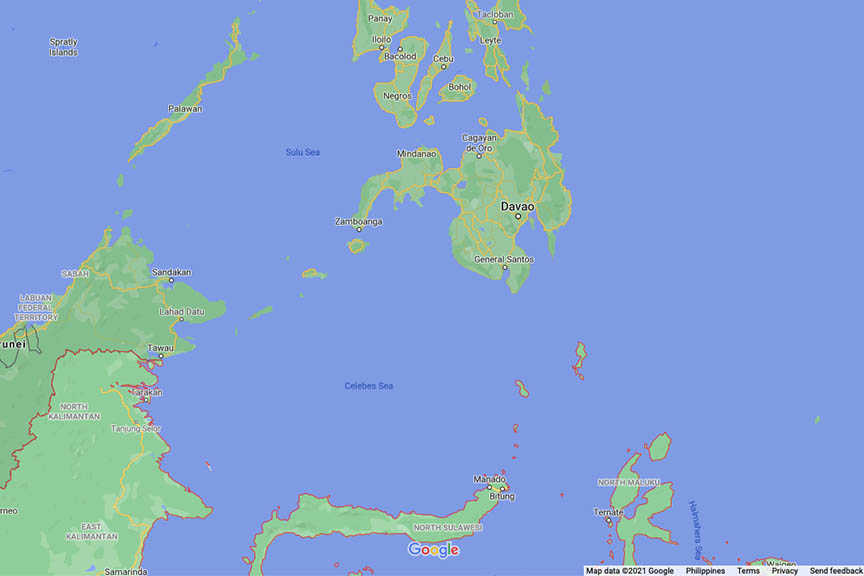GENERAL SANTOS CITY (MindaNews / 20 July) – National and local authorities have a compelling reason to be apprehensive about the surge of COVID-19 Delta variant in Indonesia which might spill over to communities in the southern portion of Mindanao.
 Mindanao and parts of Indonesia (outlined in red). Map courtesy of Google
Mindanao and parts of Indonesia (outlined in red). Map courtesy of Google
Amid this development, Secretary Carlito Galvez announced that the national government will send “thousands more doses” of the single-dose jab Janssen to this city and the island-province of Tawi-Tawi, where there is a largely unchecked cross border connection between Indonesia and Malaysia.
The move is to help avoid making GenSan and Tawi-Tawi “growth areas” of the Delta variant in the country, said Galvez, the chief implementer of the country’s COVID-19 response.
The Department of Health in Region 12 announced the arrival on Monday of 148,700 doses of the Janssen vaccine intended for the Geographically Isolated and Disadvantaged Areas (GIDAs) in the Soccsksargen Region.
The Food and Drug Administration said Jansenn, produced by American firm Johnson and Johnson, is a viral vector vaccine that requires only a single dose and would not need a cold storage facility.
There was no mention as to how many vials of the vaccine, said to be for senior citizens and persons with comorbidities, will go to this city and Sarangani.
Meantime, health and police personnel in this city are on orders to prevent fishermen and travelers from entering via the “backdoor” from any of the nearby Indonesian islands.
Mayor Ronnel Rivera said there are also the returning fishing boats that ventured into international waters and that its crew members, as well as other travelers, must be subjected to the needed testing and quarantine procedures.
“We have to implement strict protocols to protect our city from the Delta variant,” Rivera said.
In nearby Sarangani Province, police and local government officials have met to further strengthen measures to strictly enforce travel restrictions, specifically barring persons from Indonesia from entering the country from July 16 to 31.
The restriction covers travelers from Indonesia or those who have been there 14 days before their intended arrival in the Philippines.
Police Lt. Col. Fernando Cunanan Jr., commander of the Regional Maritime Unit (RMU) 12, said they have beefed up patrols along the coast and shorelines of Sarangani Province, particularly in Glan town, which is adjacent to Sarangani and Balut islands.
These islands, part of Davao Occidental, are close to the Indonesian border. Many residents of these islands usually travel to nearby Glan town and this city for their trading, household, food, medical and other needs.
Cunanan said they are working according to guidelines set in a meeting with Glan Mayor Vivein Yap, and all 16 village head in Glan along with officials from the Philippine Navy, Philippine Coastguard, Maritime Police, Glan PNP and the Bureau of Immigration and discussed a “Border Sea Patrol Policy on COVID-19.”
The policy is to make sure that no traveler from Indonesia may enter undetected to the mainland, Cunanan said. Indonesia and the Philippines share a porous sea border.
It takes only an hour or two, depending on the type of boat, to travel from the nearest island in the Indonesian archipelago to Balut island in the southern tip of Mindanao, where there is a huge concentration of people of Indonesian descent.
With the proximity, residents of Balut and Sarangani islands usually go to the nearby islands of Indonesia to fish or visit relatives and, similarly, there are also many Filipinos living in the islands along the northern Indonesian archipelago that come to Mindanao to visit relatives.
A 2016 study by the United Nations High Commission on Refugees revealed that there are 8,745 people of Indonesian descent who are living in Balut and Sarangani islands.
The Indonesian government had acknowledged that 2,425 residents of the island were confirmed to be “pure” Indonesians and the rest mixed Indonesian-Filipinos. Of the number, 300 were given Indonesian passports by no less Indonesian Foreign Affairs Minister Retno Marsudi when she visited Davao City in February 2018.
The passports have allowed some Balut island residents, who are usually referred to as Sangir, to freely travel to anywhere in Indonesia and to mainland Mindanao as well.
Indonesians first settled in Balut island in the early 1950s, thinking the island is part of Indonesia. (Rommel G. Rebollido / MindaNews)
